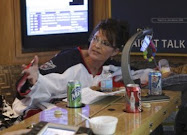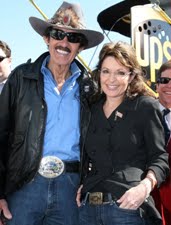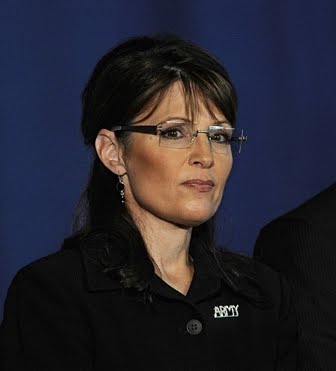
Good article in the Washington Post by David Broder:
--------------
The snows that obliterated Washington in the past week interfered with many scheduled meetings, but they did not prevent the delivery of one important political message: Take Sarah Palin seriously.
Her lengthy Saturday night keynote address to the National Tea Party Convention in Nashville and her debut on the Sunday morning talk show circuit with Fox News' Chris Wallace showed off a public figure at the top of her game -- a politician who knows who she is and how to sell herself, even with notes on her palm.
This was not the first time that Palin has impressed me. I gave her high marks for her vice presidential acceptance speech in St. Paul. But then, and always throughout that campaign, she was laboring to do more than establish her own place. She was selling a ticket headed by John McCain against formidable Democratic opposition and burdened by the legacy of the Bush administration.
Blessed with an enthusiastic audience of conservative activists, Palin used the Tea Party gathering and coverage on the cable networks to display the full repertoire she possesses, touching on national security, economics, fiscal and social policy, and every other area where she could draw a contrast with Barack Obama and point up what Republicans see as vulnerabilities in Washington.
Her invocation of "conservative principles and common-sense solutions" was perfectly conventional. What stood out in the eyes of TV-watching pols of both parties was the skill with which she drew a self-portrait that fit not just the wishes of the immediate audience but the mood of a significant slice of the broader electorate.
Freed of the responsibilities she carried as governor of Alaska, devoid of any official title but armed with regular gigs on Fox News Channel and more speaking invitations than she can fulfill, Palin is perhaps the most visible Republican in the land.
More important, she has locked herself firmly in the populist embrace that every skillful outsider candidate from George Wallace to Jimmy Carter to Ronald Reagan to Bill Clinton has utilized when running against "the political establishment."
It doesn't always win. There are more John Edwardses and Mike Huckabees than I can count. But it wins more often than you'd guess and for a greater variety of people, especially when things are not going well for the country.
Palin's final answer to Wallace showed how perfectly she has come to inhabit that part. When he asked her what role she wants to play in the country's future, she said:
"First and foremost, I want to be a good mom, and I want to raise happy, healthy, independent children. And I want them to be good citizens of this great country.
"And then I do want to be a voice for some common-sense solutions. I'm never going to pretend like I know more than the next person. I'm not going to pretend to be an elitist. In fact, I'm going to fight the elitist, because for too often and for too long now, I think the elitists have tried to make people like me and people in the heartland of America feel like we just don't get it, and big government's just going to have to take care of us.
"I want to speak up for the American people and say: No, we really do have some good common-sense solutions. I can be a messenger for that. Don't have to have a title to do it."
This is a pitch-perfect recital of the populist message that has worked in campaigns past. There are times when the American people are looking for something more: for an Eisenhower, who liberated Europe; an FDR or a Kennedy or a Bush, all unashamed aristocrats; or an Obama, with eloquence and brains.
But in the present mood of the country, Palin is by all odds a threat to the more uptight Republican aspirants such as Mitt Romney and Tim Pawlenty -- and potentially, to Obama as well.
Palin did not wear well in the last campaign, especially in the suburbs where populism has a limited appeal. But when Wallace asked her about resigning the governorship with 17 months left in her term and whether she let her opponents drive her from office, she said, "Hell, no."
Those who want to stop her will need more ammunition than deriding her habit of writing on her hand. The lady is good.
----------------

And this article, while not written by a Palin fan, is the perfect example of someone who is starting to wake up and realize that Sarah Palin is not just a joke to be dismissed:
----------------
Let's face it. We can't get rid of Sarah Palin.
In the past 72 hours, going from the molasses south of Opryland to the macho southwest of Texas to the gambling capital of Nevada and points in between, this crazy force of nature swept through, her zigzagging path shown live and on videotape repeatedly, her words and sounds parsed, deciphered, analyzed -- even the crib notes on the palm of her hand were subject of jokes at the White House and on cable TV and newspapers, on the evening news and in the blogosphere.
For a while there, with her speech on Saturday evening at the National Tea Party convention in Nashville (televised live by all three cable news networks) and her taped interview with Chris Wallace on "Fox News Sunday," where she breezily revealed she would run for president in 2012 if it was right for the country and her family, we had Palin live, Palin on tape, Palin in sound bites, Palin blithering.
Her casual statement to Wallace sent a seismic tremor across the mainstream media and across party lines.
At this premature stage of the presidential race, few prospective candidates would admit plans to run. Palin's forthright admission surprised Wallace (he said so later on his program). Apparently other commentators and pundits were surprised too, and alarmed, and discussed little else on the Monday talk shows.
Liberal pundits asked, hoping, if she would run as a third party candidate (another Ross Perot, another losing campaign), but she'd already said, in Nashville and elsewhere, that she believed that the Tea Party movement would meld with the GOP, that she didn't believe in breaking away from her party.
Palin's off-the-cuff statement to Wallace should not have been a surprise. She's been doing little else with her time but building a national base and feeding off adoring crowds. But it is one thing to speculate about her political future and another thing to hear her declare her interest and intent on national television.
Suddenly, on Sunday, a Palin presidential candidacy was no longer just a pie-in-the-sky dream of Tea Partiers.
That she is the leader of the most passionate and potent grass-roots movement of the moment (think Massachusetts, Virginia and New Jersey), there is no doubt. That she's riding a wave, there's no doubt. That she could galvanize that growing political force, there's little doubt. With a flip of her hair, the beauty queen from Wasilla could change the political field, just like that.
Polls show Palin ahead of other potential GOP presidential candidates, which may or may not be saying too much. (A CBS News poll last month found that 71 percent of Americans don't want her to run.) She is by most accounts the most popular celebrity politician in the nation, an icon to millions.
It doesn't hurt that she's got great looks and five children to boot, and that she speaks the language of the folks out there in middle America. They love it when she says things like, "How's that hope-y, change-y thing working out for ya?"
She's got that "it" factor that pundits, columnists, political junkies, and regular people go crazy trying to figure out. Now, what is it about her? Certainly only Barack Obama beats her on charisma and crowd attraction, and maybe not by that much.
Given all that, the cable news talk shows recycled the Palin weekend clips, reviewed her performance, gauged her presidential prospects (scary to most) and weighed endlessly whether the world could survive Sarah Palin.
It's bad enough that Palin resurrected herself after a disastrous vice presidential campaign and resignation as governor of Alaska last July. Her muddled explanations for quitting the governorship made her a pariah in media and political circles, and she was exiled to the silent wilds of Alaska.
Given up for politically dead, her swift and amazing comeback as author of a No. 1 best-selling memoir, "Going Rogue," and hero of the mushrooming Tea Party movement has been a shock to the system.
So there she is now, on center stage, Sarah 2.0, taking the shots.
"She's a force to be reckoned with,'' said Diane Sawyer on "ABC World News" on Monday.
But Palin's critics are legion, loud, and come in all political shades. Even a fellow conservative Republican like Joe Scarborough, the host of MSNBC's "Morning Joe," frowns at the thought of a Palin presidential candidacy. On MSNBC's "Andrea Mitchell Reports" on Monday, he said, in part, that Palin is "not the voice of somebody who's going to take on Obama in 2012."
Other critics are not quite as sensible and even-keeled. Going for the jugular has become fair game when it comes to Palin. The New York Daily News columnist Mike Lupica slashed her bloody in a Monday column in which he said that she seems to believe that "somehow she can go from being this kind of pinup girl for her Tea Party friends to the White House." He also called her a bubble-head. "You listen to her long enough and actually feel yourself getting dimmer by the minute."
Meaner and tougher Chris Mathews, the voluble host of "Hardball," makes no secret of his contempt for Sarah Palin and her followers. Agitated by the idea that Palin might dare to run for president, he dribbled a string of jabs on his shows on Monday and Tuesday, saying, among other things, "Is she a balloon-head?" and "She's got nothing going on mentally."
Really, now.



















No comments:
Post a Comment